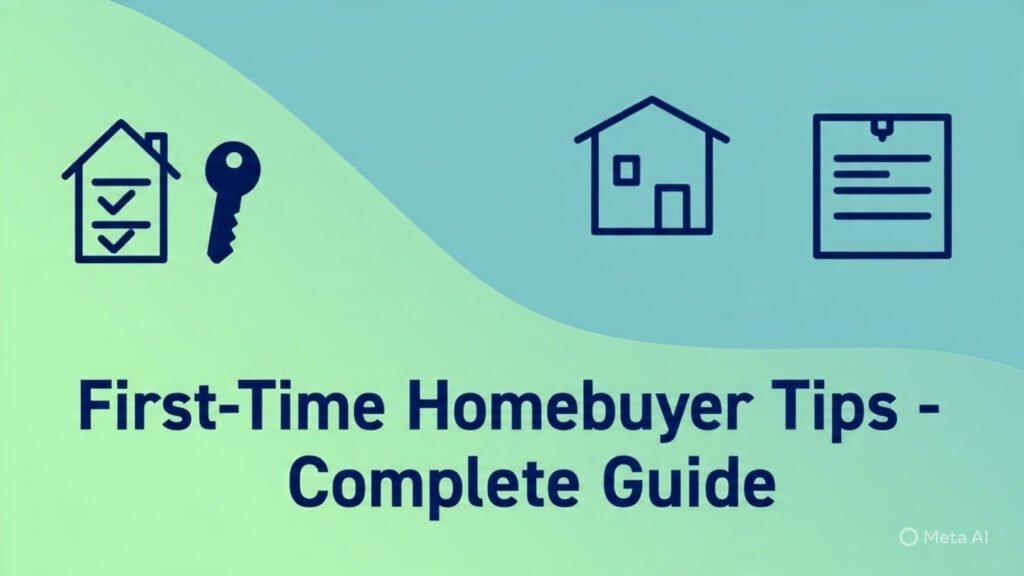Introduction
Buying your first home is both exciting and overwhelming. As a first-time home-buyer, you need the right knowledge to avoid mistakes, manage finances, and make confident decisions. From understanding mortgages to budgeting for hidden costs, this guide will walk you through the most important first-time home-buyer tips to ensure a smooth experience.

1. Understand Your Budget
Before you start looking at properties, figure out how much you can afford. Create a budget that includes not just the purchase price but also:
- Down payment
- Closing costs
- Moving expenses
- Monthly mortgage payments
- Property taxes and insurance
💡 Pro Tip: Most experts recommend spending no more than 28–30% of your gross income on housing costs.
2. Check and Improve Your Credit Score
Your credit score directly affects your mortgage eligibility and interest rates. A higher score means better loan terms.
- Review your credit report for errors
- Pay off high-interest debt
- Avoid new credit card applications before applying for a mortgage
Even if you have a lower score, some lenders offer first-time buyer programs with flexible credit requirements.
3. Explore Mortgage Options
Not all mortgages are the same. Some common options for first-time buyers include:
- Conventional loans – Standard option with good credit
- FHA loans – Government-backed, lower down payment requirements
- VA loans – For veterans and military families
- USDA loans – For rural or suburban buyers
Compare lenders and get pre-approved to understand your borrowing power.
4. Save for a Down Payment and Closing Costs
Many first-time buyers focus only on the down payment, but closing costs can add up to 2–5% of the home price.
- Automate savings every month
- Explore first-time buyer assistance programs
- Ask lenders about grants or down payment help
5. Work with a Real Estate Agent
A trusted real estate agent helps you:
- Find homes within your budget
- Negotiate offers
- Handle paperwork
- Avoid common buyer pitfalls
Choose an agent with experience in helping first-time homebuyers.
6. Don’t Skip the Home Inspection
A home may look perfect on the outside, but inspections uncover hidden issues like:
- Roof damage
- Electrical problems
- Plumbing leaks
- Foundation issues
Investing in an inspection protects you from costly surprises after purchase.
7. Factor in Hidden Costs of Homeownership
Owning a home involves more than just mortgage payments. Prepare for:
- Property taxes
- Homeowners’ insurance
- HOA fees (if applicable)
- Maintenance and repair costs
💡 Tip: Keep at least 1% of your home’s value saved annually for maintenance.
8. Be Prepared for Closing
Closing is the final step in your homebuying journey. You’ll need to:
- Sign paperwork
- Pay closing costs
- Finalize mortgage approval
- Get the keys to your new home
Make sure to review all documents carefully before signing.
FAQs – First-Time Homebuyer Tips
1. How much money should I save before buying my first home?
You should aim for at least a down payment (3–20%), plus 2–5% of the home price for closing costs.
2. Can I buy a house with bad credit as a first-time buyer?
Yes, some programs like FHA loans or first-time buyer grants help buyers with lower credit scores.
3. Do I need a real estate agent as a first-time homebuyer?
It’s highly recommended. Agents can guide you through negotiations, paperwork, and finding the right property.
4. What’s the best type of loan for first-time buyers?
It depends on your financial situation. FHA loans are popular for those with low down payments, while conventional loans work best for buyers with strong credit.
5. What should I not do before buying a house?
Avoid taking new loans, making big purchases, or changing jobs—these can hurt your mortgage approval.